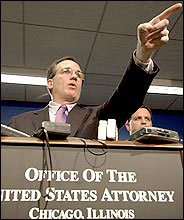This is an opinion article with a many correct truths, which I have bolded for your skimming pleasure.
By Ted Rall Wed Oct 26, 9:18 AM ET
Cracks Appear in the Constitution
NEW YORK–The phone rings with a blocked caller ID but I know who it is. My friend the film critic has just put down the same article I’ve just finished reading, a front-page blockbuster in the New York Daily News. It says that George W. Bush knew about Karl Rove’s scheme to blow CIA agent Valerie Plame’s cover for years, that he was Rove’s partner in treason from the start, that his claims of ignorance were lies. The News article is anonymously sourced but we know it’s 100 percent true because the White House won’t deny that Bush is a traitor.
“So they’ll impeach him now, right?”
My friend asked the same thing in 2001 when recounts proved Bush lost Florida, when the 9/11 fetishist admitted that he’d never even tried to catch Osama, when WMDs failed to turn up in Iraq, and when his malignant neglect killed hundreds of Americans in post-Katrina New Orleans.
“This means impeachment. Right?” Wrong.
 Any one of Bush’s crimes towers over the combined wickedness of Nixon and Clinton. And there are so many to choose from! How many times has Bush “made false or misleading public statements for the purpose of deceiving the people of the United States” (a key count in the Nixon impeachment)?
Any one of Bush’s crimes towers over the combined wickedness of Nixon and Clinton. And there are so many to choose from! How many times has Bush “made false or misleading public statements for the purpose of deceiving the people of the United States” (a key count in the Nixon impeachment)?
Stop laughing, you.
Unfortunately for my friend and the United States, impeachment is a political process, not a legal one. Nixon and Clinton faced Congresses controlled by the other party. Because Bush belongs to the same party as the majorities in the House and Senate, nothing he does can get him impeached.
Our failed Constitutional system means we’re stuck with this disastrous demagogue for three more years. Gloat now, Republican readers, but party loyalty’s stranglehold on impeachment can easily take the form of a complacent Democratic Congress overlooking the misdeeds of a batty Democratic president.
Any safe can be cracked; every system of safeguards breaks down eventually. We can’t get rid of Bush because the Founding Fathers, who were smart enough to think of just about everything, dropped the ball when they drafted the article that provides for presidential impeachment. Because there were no national political parties back in 1787, their otherwise ingenious system of checks and balances failed to account for the possibility that a Congress might choose to overlook a president’s crimes.
Small parties were active on the state and local level during the late 18th century, but James Madison, George Washington and most of the other Founders despised these organizations as harbingers of petty “factionalism” that ought to be banned or severely limited. Washington used the occasion of his 1796 farewell address to decry “the baneful effects of the spirit of party generally. It serves always to distract the public councils and enfeeble the public administration,” he warned. “It agitates the community with ill-founded jealousies and false alarms; kindles the animosity of one part against another; foments occasionally riot and insurrection…In governments purely elective, it is a spirit not to be encouraged.” Voting blocs were the enemy of good government.
In the new republic, Madison wrote in his seminal Federalist No. 10, political arguments should be considered on their own merits. Since candidates for and holders of political office would be judged solely as individuals, Congressmen would focus on the greater good rather than political alliances when weighing whether to impeach a president. Even when parties began to emerge as a national force in 1800, few politicians would have argued that a Democratic-Republican president should be safe from impeachment unless the Federalist Party happened to control Congress.
Another Constitutional breakdown, concerning the separation of powers, occurred in June 2004. More than a year after the Supreme Court decided in Rasul v. Bush that the nearly 600 Muslim men and young boys being held incommunicado at Guantanamo Bay were entitled to have their cases heard by U.S. courts, they remain in cold storage–no lawyers, no court dates. The Bush Administration simply ignored the ruling.
“[Bush’s] Justice Department,” Dahlia Lithwick wrote in Slate, “sees [the ruling] through the sophisticated legal prism known as the Toddler Worldview: Anything one doesn’t wish to accept simply isn’t true.” Because the Founding Fathers never anticipated the possibility that the nation’s chief executive would treat its final judgments with the respect due an out-of-state parking ticket issued to a rental car, the Supreme Court has been rendered as toothless as a gummy bear.
The more you look, the more you’ll find that our Constitution has been subverted to the point of virtual irrelevance. The legislative branch has abdicated its exclusive right to declare war to the president, who was appointed by a federal court that undermined the states’ constitutional right to manage and settle election disputes. Individuals’ protection against unreasonable searches have been trashed, habeas corpus is a joke, and double jeopardy has become routine as those exonerated by criminal court face second trials in civil court. Our system of checks and balances has collapsed, the victim of a citizenry more interested in entertaining distraction than eternal vigilance.
Where evil men rule, law cannot protect those who sleep.
~END~
So sites like Vote to Impeach Bush, while great to garner public support for the movement will not gain any political gain until the power of the Republicans sways to the left. A huge reason all votes will count in 2006 to push the political party to the Dems and see if they have the balls to enact some change.

 Special prosecutor Patrick J. Fitzgerald has accumulated evidence during his two-year investigation regarding this still on going leak case and it has become apparent that the motives behind the ousting of this CIA agent (Valerie Plame) is in retaliation against her husband, Joseph C. Wilson IV. In the summer of 2003, Wilson, a former diplomat, strongly accused the White House of using “twisted” and false intelligence to justify the invasion of Iraq.
Special prosecutor Patrick J. Fitzgerald has accumulated evidence during his two-year investigation regarding this still on going leak case and it has become apparent that the motives behind the ousting of this CIA agent (Valerie Plame) is in retaliation against her husband, Joseph C. Wilson IV. In the summer of 2003, Wilson, a former diplomat, strongly accused the White House of using “twisted” and false intelligence to justify the invasion of Iraq.  Maybe political and economic event always hit every generation around 30, but the CIA Leak case is just one in a series of events that show how undermining and deceiving our current government is (and you would think that forging uranium purchasing papers to start a war would be enough for a public out cry). I’m sure Karl Rove isn’t loosing sleep over this nuisance and he’ll be back to As time passes we are going to see a fanning out of issues we all have to deal with “business” however, this shouldn’t discourage any generation from getting involved with your own or next generation’s futures. We are continuing to have issues effecting younger gens; from rising education costs (US
Maybe political and economic event always hit every generation around 30, but the CIA Leak case is just one in a series of events that show how undermining and deceiving our current government is (and you would think that forging uranium purchasing papers to start a war would be enough for a public out cry). I’m sure Karl Rove isn’t loosing sleep over this nuisance and he’ll be back to As time passes we are going to see a fanning out of issues we all have to deal with “business” however, this shouldn’t discourage any generation from getting involved with your own or next generation’s futures. We are continuing to have issues effecting younger gens; from rising education costs (US  During the Clinton impeachment imbroglio, Alexander Hamilton’s definition of “impeachable offense” from Federalist No. 65 was plastered from one end of the media to the other. With the nomination of Harriet Miers to the Supreme Court, get ready for another passage from Hamilton to get similar play — this one from Federalist No. 76:
During the Clinton impeachment imbroglio, Alexander Hamilton’s definition of “impeachable offense” from Federalist No. 65 was plastered from one end of the media to the other. With the nomination of Harriet Miers to the Supreme Court, get ready for another passage from Hamilton to get similar play — this one from Federalist No. 76: